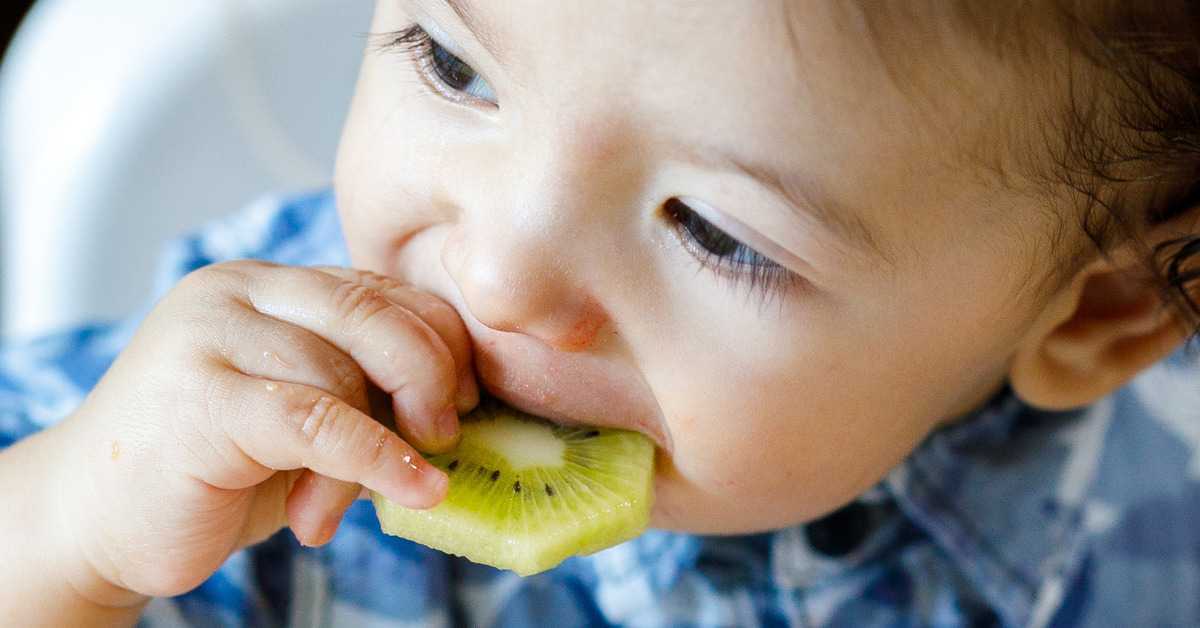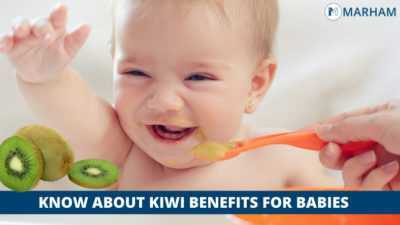Kiwi Benefits For Babies are very famous. As colors and crunchiness appeal to children, so parents should include a variety of fruits and vegetables in their child’s diet. Colored produce contains diverse nutrients that are essential for a baby’s growth and development. As a result, foods of all colors must be included. So, how about some Kiwi for the little ones? We break out the different aspects of feeding this fruit to your children.
Kiwis are high in fibre, vitamin C, and a variety of other minerals. Due to the abundance of vitamins and minerals in the fruit, it protects against diseases and provides numerous health benefits. Because it has so many advantages, let us look at its nutritional content, the best time to give it to the baby, the precautions to take, the advantages, the selection and storage technique, as well as some delicious recipes.


Kiwi For Babies: Know the Nutritional Facts of Kiwi
Kiwi is a nutrient powerhouse, but due to the presence of vitamin C, it has minimal acidic characteristics, which could cause the baby to have loose bowel movements or a stomach pain. If they don’t like the taste, some newborns will vomit it up.
Some Interesting Nutrition Facts About Kiwi
- Kiwis are high in vitamins, fibre, folate, and antioxidants, and they improve newborns’ immune systems and wound healing.
- They also aid in the treatment of constipation and the prevention of diseases. Kiwis aid in the fight against cancer, as well as decreasing blood fat levels and preventing asthma .
- Calcium, iron, chromium, copper, potassium, magnesium, and zinc are all abundant in kiwis. Talk to a nutritionist right now to discuss any problem
When Can I Introduce Kiwi to My Baby?
Only introduce kiwi when the child is between the ages of eight and nine months. If the baby develops a stomach pain or any diaper rashes, the feeding should be halted immediately and resumed after a few months. Always start with a little portion and see how people react. Only after the baby has begun to enjoy it should it be added to the normal diet.
Benefits of Kiwis For Babies
The fruit is high in nutritional value and delicious, making it one of the greatest fruits to give to your infant. They provide the following advantages to your child:
- Kiwis are high in minerals that are essential for your child’s healthy development. Calcium, iron, chromium, copper, potassium, magnesium, and zinc are all abundant in it. It helps to enhance the immune system because it contains a lot of vitamin C.
- They’re a good source of fibre, so they’re great for getting rid of constipation. Kiwis provide 16 percent of the RDA for fibre. Kiwis also provide 10 percent of the RDA for folic acid and 10 percent of the RDA for Vitamin E for your infant.


- Because kiwifruit is high in phytonutrients, it can prevent a newborn from certain types of cancer. These fruits are great for keeping your skin healthy.
- Kiwi aids in the sleep of infants. Healthy growth and development are aided by adequate sleep.
- Kiwi is high in vitamin C, which promotes iron absorption. If you feed your newborn kiwi, they may be less prone to develop asthma, high blood pressure, kidney stones, or obesity. Kiwi may also help to prevent blood clots later in life.
Measures to be Taken While Giving Kiwi to Your Baby
The following are some precautions to take before giving kiwi to a baby:
- If the baby has any responses to fruits like papaya or pineapple, the kiwi is likely to have the same reaction.
- Fever, swelling lips and face, vomiting, breathing issues, and wheezing are some of the signs of kiwi allergy in babies.
- Start with small amounts and monitor for adverse effects and allergies when introducing kiwi fruits.
- Before introducing any new fruit or food to your infant, consult with his or her pediatrician.
Consult with a nutritionist to know more about kiwi benefits and proper intake.
When to Avoid Offering Kiwis For Baby?
Never give your kid Kiwi if they have:
- Hay fever in babies
- Sensitive stomach
- Acid reflux
- Rashes
Also, never give Kiwi to an infant who has previously been exposed to the following foods:
- Pineapple
- Apple
- Cherry
- Latex Papaya
- Peach
- Plum
- Celery
- Pear
- Sesame seeds
Allergies to birch pollen, cedar pollen, and latex are all linked to kiwi fruit in some way.


Consult the Best Nutritionists in Pakistan
Book an appointment now, to answer all your queries. You can book an appointment with the top nutritionists in Pakistan through Marham by calling at Marham helpline: 0311-1222398 or by online booking facility through the website or Marham mobile app.
Can’t Find The App?
| Android | IOS |
|---|---|
  |
  |
FAQ’S
When can we give kiwi to babies?
Between the eighth and tenth months of a baby’s life, a kiwi should be introduced. If the baby displays signs of intolerance, such as a diaper rash or stomach problems, wait a few months before trying again.
How do I give kiwi to my baby?
- Place the kiwi on a cutting board and cut it in half. Remove the ends using a knife.
- Place the kiwi on one of its flat ends. Remove the remaining peel by slicing down.
- Place the kiwi on a flat surface and cut slices.
Can babies eat kiwi skin?
Actinidain, found in kiwifruit, can induce allergic responses. If the kiwi fruit is not chopped properly, it might strangle babies. Because of the choking hazard, kiwi skin is not advised for babies.
Can my 7 month old eat kiwi?
Because kiwi is acidic, give it to a baby after they’ve had other foods, at 7 or 8 months. Acidic meals can sometimes produce a mild skin response in newborns.

